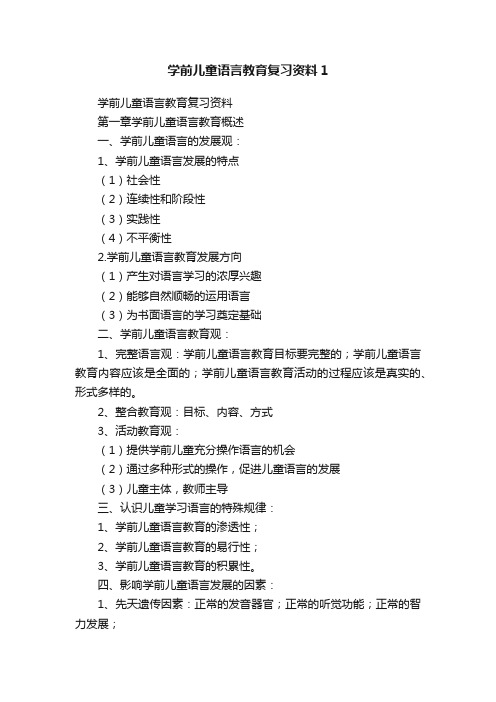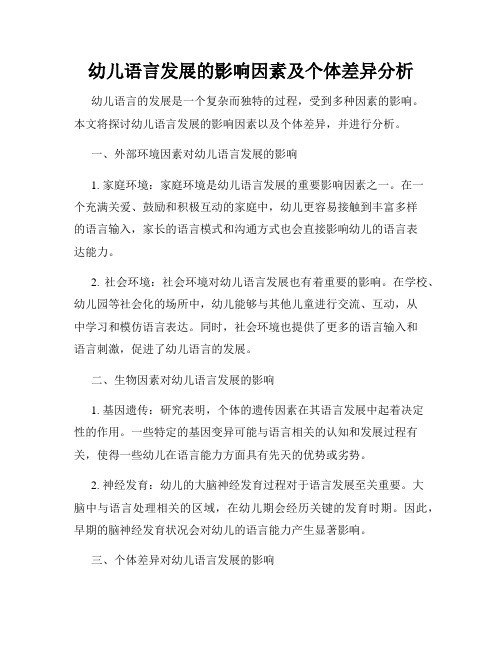影响幼儿语言发展的因素(英文)
影响儿童语言发展的因素

影响儿童语言发展的因素
(一)遗传因素
1.正常的发音器官(喉咽舌唇齿鄂)等结构
发音器官的保护:保持良好的卫生习惯不抠鼻子
保护好口腔牙齿的清洁加强体育锻炼预防感冒
当孩子有炎症时减少孩子发音
2.正常的听觉功能(十六周的胎儿就有听力功能)
儿童只有先接受外界语言的刺激才会做出相应的
应激反应,然后逐渐产生语言
阻止幼儿大声吼叫的方法:一先告知幼儿是不对行为
二老师做出正确的发音方式包括音量语态语速语句内容的丰富性表达适于幼儿接受水平,用普听话
三若小孩子继续大吼就忽视它的行为
3.正常的智力发展。
学前儿童语言教育复习资料1

学前儿童语言教育复习资料1学前儿童语言教育复习资料第一章学前儿童语言教育概述一、学前儿童语言的发展观:1、学前儿童语言发展的特点(1)社会性(2)连续性和阶段性(3)实践性(4)不平衡性2.学前儿童语言教育发展方向(1)产生对语言学习的浓厚兴趣(2)能够自然顺畅的运用语言(3)为书面语言的学习奠定基础二、学前儿童语言教育观:1、完整语言观:学前儿童语言教育目标要完整的;学前儿童语言教育内容应该是全面的;学前儿童语言教育活动的过程应该是真实的、形式多样的。
2、整合教育观:目标、内容、方式3、活动教育观:(1)提供学前儿童充分操作语言的机会(2)通过多种形式的操作,促进儿童语言的发展(3)儿童主体,教师主导三、认识儿童学习语言的特殊规律:1、学前儿童语言教育的渗透性;2、学前儿童语言教育的易行性;3、学前儿童语言教育的积累性。
四、影响学前儿童语言发展的因素:1、先天遗传因素:正常的发音器官;正常的听觉功能;正常的智力发展;2语言环境:亲子环境;社区环境;幼儿园环境4、语言教育;4、认知发展。
8、学前儿童语言教育的意义①促进学前儿童的社会性发展②促进学前儿童认知能力的发展③促进学前儿童语言的发展④有利于学前儿童心理健康和成熟五、心理研究证明,0~3岁阶段是孩子语言能力发展最快、学习效果最好的阶段。
因此,从孩子出生到三岁都是孩子学说话的最佳时期,也是关键期。
六、0~3岁儿童语言培育的目标:0~1岁半阶段主要是语音训练阶段,首先要让孩子听到语音。
其次要培养孩子听到别人对自己说话时,能用声音、手势、表情或单词做出反应。
1岁半到3岁是儿童语言快速发展时期,也是说话能力培育的关键期。
具体目标可以定为:喜欢听和谐悦耳的声音、乐意听别人说话;喜欢听成人讲述玩具、图片上的物体以及念儿歌、讲故事,并能参与念儿歌、讲故事,喜欢翻阅图书,说出自己的姓名、年龄,能简单回答别人的问题,能说方言或普通话的词,并能让别人听懂,能积极主动地学习新词和新句型,喜欢在游戏中和同伴交谈等。
婴幼儿言语发展的规律

婴幼儿言语发展的规律
婴幼儿言语发展的规律,大致可以分为以下几个阶段:
1.前期语言阶段(0-1岁):这个阶段的婴幼儿主要是通过发音和模仿发音来为言语的产生做积极的准备。
他们能辨别成人表情、动作和语言,并开始理解一些日常用语和指令。
2.言语发生阶段(1-2岁):这个阶段的婴幼儿开始说一些单词,然后是双词句,他们的词汇量快速增长,具有言语表达、言语沟通的需求。
3.基本掌握口语阶段(2-3岁):在这个阶段,婴幼儿可以说一些简单句,并开始运用疑问句。
他们的言语交往的意图更加明显。
影响婴幼儿语言发展的因素包括:
1.父母与孩子的交流和互动:父母的语言输入和与孩子的交流对孩子的语言发展起着关键作用。
2.语言环境和刺激:给孩子提供丰富的语言环境和刺激,鼓励他们听、说、模仿,能够促进他们的语言发展。
3.孩子的兴趣和积极性:让孩子对语言产生兴趣和积极性,例如通过阅读、唱歌、讲故事等方式,能够激发他们的语言学习能力。
幼儿园幼儿语言发展研究报告 幼儿园语言发展研究

一、研究目的二、研究方法三、研究结果1. 幼儿语言发展的主要特点2. 影响幼儿语言发展的因素3. 幼儿园语言教育的现状分析四、影响幼儿语言发展的因素1. 家庭环境对幼儿语言发展的影响2. 幼儿园教育对幼儿语言发展的影响五、幼儿园语言教育策略1. 促进幼儿语言发展的活动设计2. 培养幼儿语言表达能力的方法六、结论和建议一、研究目的本研究的目的是通过对幼儿园幼儿语言发展进行深入研究,分析幼儿语言发展的主要特点、影响幼儿语言发展的因素以及幼儿园语言教育的现状,旨在为提高幼儿园语言教育质量提供理论支撑和实践指导。
二、研究方法本研究采用文献综述和实地调研相结合的方法,通过查阅大量相关文献资料并深入到幼儿园进行观察和访谈,获取相关数据并进行分析,全面诊断幼儿园幼儿语言发展的现状。
三、研究结果1. 幼儿语言发展的主要特点幼儿语言发展呈现出阶段性和个体差异性的特点,其中包括语音、词汇、语法、语用等方面的发展特点。
2. 影响幼儿语言发展的因素家庭环境、幼儿园教育和社会环境等因素对幼儿语言发展都有一定的影响,其中家庭环境是最为重要的影响因素之一。
3. 幼儿园语言教育的现状分析目前,幼儿园语言教育主要以游戏活动、情景教学和启发式教学为主,但存在着教学资源不足、师资力量不足、教学方式单一等问题。
四、影响幼儿语言发展的因素1. 家庭环境对幼儿语言发展的影响家庭是幼儿最重要的语言环境,家庭的语言环境对幼儿的语言发展起着至关重要的作用。
父母、长辈的语言模式、语言氛围、家庭文化等都会对幼儿的语言发展产生影响。
2. 幼儿园教育对幼儿语言发展的影响幼儿园作为儿童学前教育的重要场所,对幼儿的语言发展起着至关重要的作用。
幼儿园的教育环境、教学活动、师资力量等都与幼儿的语言发展密切相关。
五、幼儿园语言教育策略1. 促进幼儿语言发展的活动设计幼儿园可以通过丰富多彩的游戏活动、情景教学、启发式教学等方式,激发幼儿的学习兴趣,促进幼儿的语言发展。
幼儿语言发展的影响因素及个体差异分析

幼儿语言发展的影响因素及个体差异分析幼儿语言的发展是一个复杂而独特的过程,受到多种因素的影响。
本文将探讨幼儿语言发展的影响因素以及个体差异,并进行分析。
一、外部环境因素对幼儿语言发展的影响1. 家庭环境:家庭环境是幼儿语言发展的重要影响因素之一。
在一个充满关爱、鼓励和积极互动的家庭中,幼儿更容易接触到丰富多样的语言输入,家长的语言模式和沟通方式也会直接影响幼儿的语言表达能力。
2. 社会环境:社会环境对幼儿语言发展也有着重要的影响。
在学校、幼儿园等社会化的场所中,幼儿能够与其他儿童进行交流、互动,从中学习和模仿语言表达。
同时,社会环境也提供了更多的语言输入和语言刺激,促进了幼儿语言的发展。
二、生物因素对幼儿语言发展的影响1. 基因遗传:研究表明,个体的遗传因素在其语言发展中起着决定性的作用。
一些特定的基因变异可能与语言相关的认知和发展过程有关,使得一些幼儿在语言能力方面具有先天的优势或劣势。
2. 神经发育:幼儿的大脑神经发育过程对于语言发展至关重要。
大脑中与语言处理相关的区域,在幼儿期会经历关键的发育时期。
因此,早期的脑神经发育状况会对幼儿的语言能力产生显著影响。
三、个体差异对幼儿语言发展的影响1. 性别差异:研究显示,在语言发展方面,男性和女性之间存在一定的差异。
女性幼儿往往比男性幼儿更早地开始语言表达,掌握语言规则也更快,这可能与性别在认知和社交发展上的差异有关。
2. 社会经济地位:个体的社会经济地位与语言发展之间存在一定的关联。
研究发现,更高的社会经济地位往往与更多的语言刺激、更优质的语言环境相关,从而促进了幼儿的语言发展。
3. 幼儿特质:每个幼儿都有其独特的个体差异,包括个性特点、兴趣爱好等。
这些特质也会对幼儿的语言发展产生一定影响。
例如,性格外向、好奇心强的幼儿可能更愿意与他人进行交流,从而促进语言的积累和表达。
四、幼儿语言发展的个体差异分析幼儿语言发展的个体差异表现在多个方面。
有些幼儿在语言发展上表现出较快的进展,具有较好的语言表达能力,而另一些幼儿则进展较慢,有时可能存在语言障碍。
影响幼儿语言发展的因素

影响幼儿语言发展的因素幼儿语言发展是一个复杂而多样化的过程,受到许多因素的影响。
下面是一些常见的影响幼儿语言发展的因素:1.家庭环境:家庭环境是幼儿语言发展的重要因素。
家庭中的语言环境对幼儿的语言学习起着关键的作用。
父母的语言输入和交流方式对幼儿的语言发展具有直接影响。
如果父母在家中注重语言交流,并向幼儿提供适当的语言输入,那么幼儿的语言发展会得到良好的促进。
2.社交经验:幼儿在社交互动中学习语言。
与其他孩子和成年人的交流经验可以帮助幼儿扩展他们的词汇量、理解语法规则以及发展沟通技巧。
3.智力和认知能力:幼儿的智力和认知能力对于语言发展有重要影响。
智力水平高的幼儿在词汇量、记忆力和理解语法规则方面往往表现出更好的表现。
4.个体差异:幼儿之间的个体差异在语言发展中起着重要的作用。
每个幼儿的语言能力和发展速度都有所不同。
有些幼儿可能比同龄人更早地开始说话,而有些幼儿可能需要更长时间来发展他们的语言能力。
5.学习机会和教育资源:幼儿的学习机会和教育资源对于语言发展至关重要。
接触到丰富的语言材料、听故事、玩语言游戏以及参加语言培训课程等都可以帮助幼儿扩展他们的词汇量和语言技能。
6.社会经济状况:社会经济状况可以影响到幼儿语言发展。
研究表明,生活在贫困家庭中的幼儿可能面临语言发展的挑战。
这可能是因为他们接触到的语言输入较少,缺乏学习和语言发展的机会。
7.文化背景和语言环境:文化背景和语言环境对幼儿的语言发展具有深远影响。
幼儿生活在不同的文化和语言环境中,他们接触到的语言输入和交流方式可能会有所不同,这对他们的语言发展产生重要影响。
影响儿童语言发展的因素

影响儿童语言发展的因素幼儿语言发展是一连串的学习过程,任何阶段受到干扰,都可能影响下一阶段,造成孩子语言发展程度与年龄不合,而有明显落后的现象。
譬如,正常的3岁孩子,已会使用一些平均由4个左右的单字组成的简单句子,像:弟弟吃饼干、妈妈泡牛奶。
若孩子3、4岁了仍说不出任何有意义的词汇,就很可能是语言发展迟缓了。
经过研究,总结出影响幼儿语言发展的因素有以下几点。
(一)遗传因素孩子的语言类型常常和父母的语言类型很相似。
如果你为人父,为人母,问问父母你的语言发展过程,就可以得到一些孩子懂话很早,但开口说话却很晚,这很可能是因为他们的舌头肌肉的构造,天生就有问题,这是他们会说话比较晚。
(二)文化因素儿童成长过程受社会文化导向的影响,任何成人与儿童的交往行为都携带了某种社会文化的因素,并通过交流互动传递给儿童,而人类社会文化的延续和发展正是在这样的过程中得以代代相传。
儿童社会化的过程本身就是一个儿童学习和获得文化的过程,而儿童语言的发展和儿童文化的学习具有共变的作用。
在众多的文化因素中,最重要的两个因素是语种和语言观念。
1.语种不同的语言是不同民族或种族的文化符号,语言单位的组合方式和使用方式具有不同的文化内涵,反映了不同的文化积淀,这必然影响着儿童语言发展的速度和特点。
语种对儿童语言发展的影响最初表现在语音方面。
新生儿对人类声音的音高范围非常敏感,他们有一种惊人的语感能力,能够分辨出语音的细微差别,这一技能可以帮助他们破译本民族语言的语音代码。
这一事实和语言学的语言发展理论相一致。
此外,学者对儿童汉语习得方言的研究结果也表明,语种对儿童语言能力的发展有重要影响。
2.语言观念语言观念是指人们对语言的认识、情感和审美情趣等一系列态度和看法。
语言观念在儿童语言的发展中非常重要。
有人比较了中国与外国或不同地区儿童在使用和习得形容词的先后顺序时发现,儿童常用的形容词和当地的文化有较高的相关性,尤其是语言观念和地方文化对儿童语言的发展具有综合作用,这也为社会相互作用语言发展理论提供了强有力的支持。
影响幼儿语言发展的因素及教育策略

影响幼儿语言发展的因素及教育策略引言语言能力是幼儿认知和社交发展的重要组成部分。
在幼儿期,他们处于最敏感的语言学习阶段,因此理解并掌握影响幼儿语言发展的因素及相应的教育策略对于促进他们的整体发展至关重要。
本文将讨论一些主要影响幼儿语言发展的因素以及应采取的教育策略。
影响因素1. 家庭环境幼儿在家庭中接受到的语言输入对其语言发展起着决定性作用。
以下是一些家庭环境对幼儿语言发展的影响因素:•亲子互动:父母与孩子之间经常进行沟通与交流,尤其是使用正确且丰富的词汇表达。
•朗读和讲故事:通过朗读和讲故事激发幼儿对文字和语言的兴趣。
•无屏时间:限制电子屏幕时间,鼓励面对面交流和参与其他有意义的交流活动。
•多语言环境:若家庭中使用多种语言,有助于提高幼儿的双语或多语言能力。
2. 社交互动社交互动是幼儿习得语言的重要途径。
以下是一些社交互动对幼儿语言发展的影响因素:•幼儿园和托儿所:与同龄人和教育专业人士进行沟通和互动会促进幼儿的语言发展。
•合作游戏:参与合作游戏可以锻炼幼儿的口头表达和理解能力。
•观察模仿:观察成年人、兄弟姐妹或其他孩子,并尝试模仿他们的语言行为。
3. 身体健康身体健康状况也会对幼儿的语言发展产生影响。
以下是一些身体健康对幼儿语言发展的影响因素:•听力功能:确保幼儿没有听力障碍,以便他们准确听到并理解周围环境中的声音。
•健康饮食:提供均衡饮食,并确保幼儿获得足够的营养,以促进大脑和语言发育。
教育策略为了促进幼儿的语言发展,教育策略起着重要作用。
以下是一些可以采取的教育策略:1.提供丰富的语言输入:父母、教师和照顾者应提供有意义和丰富的语言输入,通过详细描述环境、使用多样化的词汇和句型来培养幼儿对语言的兴趣。
2.赋予幼儿主动表达能力:鼓励幼儿用句子回答问题,并提供机会让他们与他人分享自己的想法和感受。
3.经常进行朗读和讲故事:这有助于扩大幼儿词汇量和理解能力,同时激发他们对阅读和文字的兴趣。
4.创造良好社交环境:提供与同龄人互动的机会,参与集体活动或团队游戏,以促进幼儿在真实情境中运用语言交流。
- 1、下载文档前请自行甄别文档内容的完整性,平台不提供额外的编辑、内容补充、找答案等附加服务。
- 2、"仅部分预览"的文档,不可在线预览部分如存在完整性等问题,可反馈申请退款(可完整预览的文档不适用该条件!)。
- 3、如文档侵犯您的权益,请联系客服反馈,我们会尽快为您处理(人工客服工作时间:9:00-18:30)。
Factors which Influence Children's Language development影响幼儿语言发展的因素AbstractNowadays children play a very important role in a family, parents pay so much attention o children's development, From a very young age, they focus on children's language development,which is so important on children's all life. Why there are differences among children's language ,what factors can influence children's language development? After learning some answers of these questions, parents can help their children develop language ability better.Key words: children; factors; language developmentYoung children stage is the key stage for one's language development, the children's language ability get breakthrough in quantity. In this period, not only the vocabulary increased rapidly, but also can master a variety of complex sentence patterns, and understand deeper of the sentence meaning, also can communicate according to different context.During the the key period of children's language development, if we can find the influence factors of the development and actively creating related conditions, doing specific training, then it will promote children's language development.However, what factors referenced to language development?Generally speaking, children's language development related to individual conditions , at the same time it also can not get away from environmental, educational and social conditions. Some specific factors as follows:(一)Individual factors:Children as an individual of language learning and development, its language development related to the individual's own biological factors, cognitive factors and emotional factors.1.Biological factors:1.1As is known to all, language is the tool of thought , also is a mean of communication. That is, the value of the language reflected a kind of function, and the function have relevant to the structure ,it is certain function of the structure.The realization of the function cannot get away from certain material structure, namely the language pronunciation organs.Whetner infants' pronunciation organ is normal or not will affect the development of its language ability.1.2 Age factor. Language learning is obviously influenced by age. Age is the main effect factor of vocabulary development. At the same,it is also influence the development of grammar, with the incease of the age,phrase structures will gradually appear.1.3.In general the girl's language development will starte earlier than boy's , and oral expression ability is better. But after entering the primary school, gender difference phenomenon can decrease,language ability of boys' and girls' has no obvious difference.1.4 The personality characteristics. Congenital temperament is shy, introverted, or self-distrust infants,their language ability will be worse.children1.5.Health problems.For the physical emaciated or long-term sickchildren, they may have less chance to play games,and their learning experience is insufficiency, so their language development is not as good as healthy children.(二)Cognitive factors.2.1 Children learn language is neither like a parrot nor "eat at full", they use languge with own understanding and memory, then apply to certain language situation, and make some creation. Visiblely, children's language development is closely related with its cognitive ability.2.2 Learning ability. Some children have sensitive study ability and imitate ability, their language development are earlier and better, on the contrary, the language development is easy to have deviation, sluggish situation.(三)Emotional factorsChildren learning language is not passive, but actively choose and absorblanguage elements, that is, due to their different attitude towards the languge learning emotion , the language development is also different. In the process of language learning,iinfants also will be affected by the emotional factors.The so-called emotional factor means children infiunced by social factors make psychological reaction. Adults like or dislike children's performance, was enough to affect infants' talk will. In addition, children in group life establish their impression among themselves and others. A child who love oneself, love the children around them, will be happy to express themselves and speak full of confidence.Instead, if a child feel not popular in the group or he don't feel happy, his will to speak will reduce,also have no interest to listen to others . In the long run, his language ability's development will be affected greatly .In the process of infants' language learning, parents' love and encouragement are very important. Those who get parents' love and care, they usually have more time communicate with parents , have more opportunities to experience all sorts of things, including play games and contact environment, thus stimulating them to express ideas and talk to others, so as to enrich and accumulate language experience.Instead, those who can't get the parents’love and care, such as a child growing up in an orphanage, generally their language development are slow. In addition, some parents don't respect their children, and would not listen to their expression patiently, would not answer inspirely about their questions, even have little communication with children ,their children's language development level will be slow as their incorrect language education ideas.We can see that language is developed in love and care, Parents should give children a lot of love and care,and communicate more with their children, this will help children's language development.In fact, language learning and learning is the same as other things, if a child often be encouraged, he will have a positive and active learning desire,thus receiving good learning effect.Conversely, if children are often accused and criticised by adults, or adult often put forward some opinions such as picky their pronunciation, this will make children lose confidence to language learning, even become silent, do not wish to open his mouth.(四)Environmental factors.Children's language learning cannot get away from certain environment. Children always contact with people in the environment , and language as a human communication tool, it is learnt, mastered and used in the environment by young children.Environmental factors include cultural level of parents, parents' occupation,family economic condition and so on. The development of language is related to the amount of stimulus information provided by the environment , the more the chlidren accept the outside stimulus information, the faster its language development.(五)Educational factors.Education differences can also lead to the difference of children's language development.Family education has a huge role for the early language development of infants.Parents often read parenting books,their children's language development is superior to other children. The kindergarten education has effect that family can't replace, through the cooperative games can provide medium to do exercises and enhance the language skills.Children through the interaction and learning in the game ,it can promote their language development.Children can spontaneously learn language through communicating with people in the environment, but more is through learning to applicant and master the method on the education situation with consciousness, to obtain development.(六)Social factorsSocial factors have considerable influence on children's language learning. Here said the social factors, it means the people and things which children's contact with , such as adults and companions' attitude towards him. The social effective factors are various, the most important is the social life of the child, adults' language environment and their attitude to treat the children.6.1. The influence of social life environmentChildren get language in certain social life environment which is cross combination by material and spirit, family and social factors . These various kinds offactors will have great or subtle influnce on children's language development directly or indirectly, .The Investigation of Using Adjectives of Children written by Wu Jinzhi shows us many examples about different environments affect children's language development. For example, the SaNiZu live in mountainous areas in Yunnan, SaNiZu children to the adjective "steep",which is used to describe the mountain,are masteR earlier than the Han nationality children; Sichuan and Hunan is known to eat chili, children in these two areas master the word "hot" earlier a year or year and a half than other parts of the children.6.2.Adults' language ideas:Language concept means people's a series of attitudes and opinions about language . Such as oral language and written language status, the emotins towards the native language and foreign and so on. Adults' language concep thas certain effect for children language learning.For example, Chinese have a deeply rooted traditional language concep still influence today: pay more attention to the written language, the contempt to oral English. Through thousands years,our Chinese pay special attention to children to study bible literacy, education of chanting, composition, and despise oral English education.Now that we clearly know the influence factors of children's the language development ,we can reasonably use the relevant conditions to promote children's language development effectively. Every vocal language organs normal children can develop a flexible thinking and glib child, as long as the parents building a good education environment, cultivate children's interset to think languge and understanding language , stimulates children's language learning interest, encouraging children actively communicating,learning, imitation, absoringb and use the language!There is no child who is not good at learning language,only parents who do not good at leading their children to learn.1.李宇明《。
